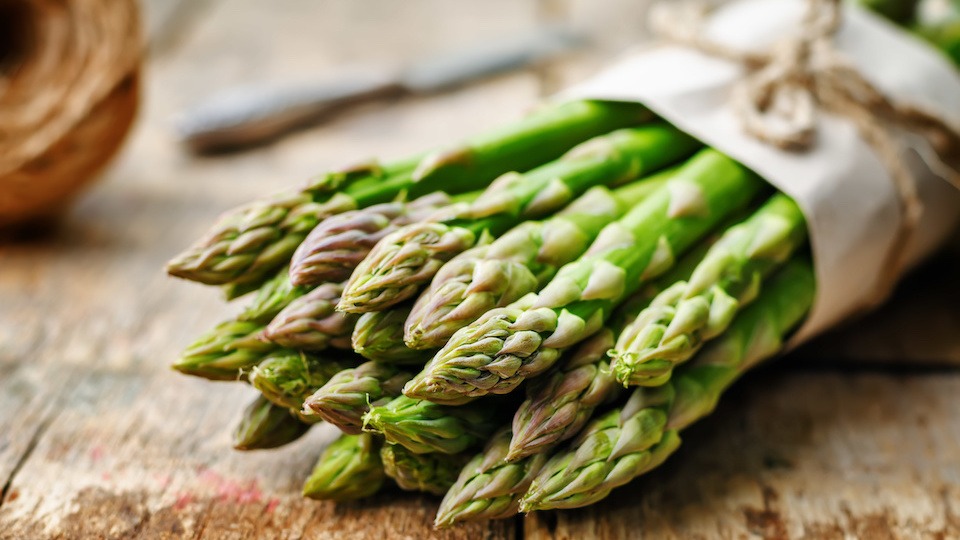Yes, it makes your pee smell weird. But this is a small price to pay for all the fantastic benefits of this nutritious veggie. It’s time to enhance your enjoyment of asparagus by exploring new and exciting ways to cook and prepare these green stalks. Here are our favorite health benefits of asparagus and how to incorporate more into your diet.
Loaded with vitamins
Asparagus is an excellent source of micronutrients, including iron, zinc, and riboflavin. It is also full of vitamin K (critical for blood clotting and proper bone health), along with folate and vitamins A, and C. Potassium is also another top component of asparagus, which helps manage blood sugar. To top it all off, it is low in calories, which means that you can get critical nutrients without maxing out your daily calorie limit. (In other news, calorie counting isn’t exactly as helpful as you may think.)
Great source of antioxidants
Here at UpWellness, we talk a lot about antioxidants. These are simply compounds in certain foods that can help protect your cells from the harmful effects of free radicals and oxidative stress. According to countless studies, oxidative stress is a legitimate cause for concern since it contributes to many issues such as early aging, chronic inflammation, and chronic diseases such as cancer. Green vegetables, like asparagus, help clear your body of this stress and reduce your risk of heart attacks and heart disease.
Help with weight loss
If you haven’t figured it out yet, vegetables are often the secret to shedding that extra visceral fat. Food is medicine and filling your body with real, green food that nourishes instead of damages is a crucial step towards achieving your weight loss goals. Asparagus is also loaded with soluble and insoluble fiber which can help keep you full for longer and reduce unhealthy snacking in between meals.
Natural diuretic
Infrequent urination can lead to urinary tract infections and other fluid retention issues such as swelling and edema. The amino acid asparagine is a natural diuretic that flushes toxins, excess fluid, and salt out of your body. Of course, if you eat a large quantity of asparagus, you’ll want to make sure you’re not far from the toilet.
Lowers blood pressure
More than 1.3 billion people in the world suffer from high blood pressure, which is the precursor for a number of concerning health issues. Animal studies have shown that potassium-rich vegetables like asparagus may help to relax the walls of the blood vessels and excrete excess salt through urine.
How to eat more asparagus
Pair it with eggs
Like other green veggies, asparagus pairs particularly well with egg dishes. Add it to scrambled eggs or enjoy it as a side with your poached egg. You can also whip up a delicious omelet with feta cheese, asparagus, and sundried tomatoes. What better way to start your morning?
Steam on the stove
Though it may be a little flavorless on its own, steamed asparagus with a little salt and pepper can be a great, heart-healthy side dish. Don’t be afraid to experiment with your favorite seasonings.
Eat with veggie dip
Believe it or not, asparagus doesn’t have to be cooked to be enjoyable. Eat the stalks raw with homemade veggie dip. Simply use Greek yogurt as a base, and add in your desired amounts of lemon juice, minced garlic, and spices such as dill or lemon pepper. Throw in whatever sounds good to you!
Bake in the oven
Baked asparagus is wonderfully soft, with just a little bit of crunch. The baking process enhances the natural flavor of the yummy stalks. Drizzle olive oil over the asparagus and sprinkle with salt and pepper (top with a few red pepper flakes for some heat) and cook at 400 degrees Fahrenheit for 20 minutes or until crisp. Keep an eye on it to make sure it doesn’t burn.
Grill it
Fire up your grill and cook your asparagus over the open flame. It will have a delightful smoky flavor, and all of the nutrients will still be preserved. Enjoy as a side along with kebobs or other grilled meals.
How do you like to enjoy asparagus? Let us know in the comments below!







